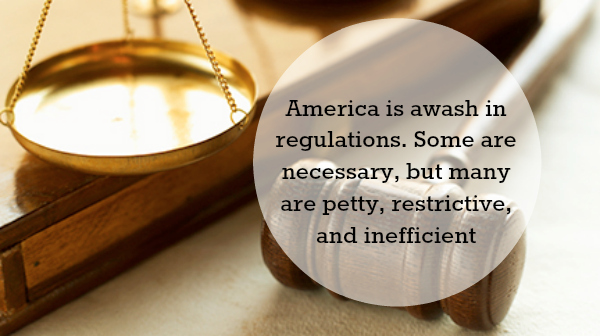America is awash in regulations. Some are necessary, but many are petty, restrictive, and inefficient. Charles Murray was on my radio program to talk about his new book, By the People: Rebuilding Liberty Without Permission. He not only has some alarming statistics about the explosion in government regulations, but also proposes solutions for fighting them.
Most of us are committing crimes and don’t even know it. The number of federal crimes you could commit has increased 50 percent since 1980. The Affordable Care Act has 400,038 words, and Dobb-Frank has 377,491 words. The Code of Federal Regulations has over 175,000 pages.
We can all agree that some regulations protect our safety and our environment. But Charles Murray reminds us that many regulations are written by “bureaucrats with way too much time on their hands.” There are mandates for such things as the type of “latch for a bakery’s flour bins or the proper way to describe flower bulbs to customers.” Regulations waste our time and prevent us from doing our jobs as well as we could.
He reminds us that the regulatory state has two weaknesses: it relies on voluntary compliance and it is limited in its enforcement resources. The regulatory state is the Wizard of Oz. It can sound fearsome with a booming voice when directing its attention at an individual citizen. It is less effective if lots of citizens decide to simply ignore a stupid regulation.
He proposes a private legal defense fund, called the Madison Fund, to aid businesses and citizens who stand up to federal regulators trying to force compliance to pointless rules. The goal would be to empower citizens so they could say: “If you come after me, it’s going to cost your office a lot of time and trouble, and probably some bad publicity.” If a bureaucrat already has ten other similar cases, “its unlikely the bureaucrat’s supervisor will even permit him to take it on.”
America has too many pointless regulations. Maybe it’s time to ignore some of them.
 Listen Online
Listen Online Watch Online
Watch Online Find a Station in Your Area
Find a Station in Your Area











 Listen Now
Listen Now Watch Online
Watch Online
